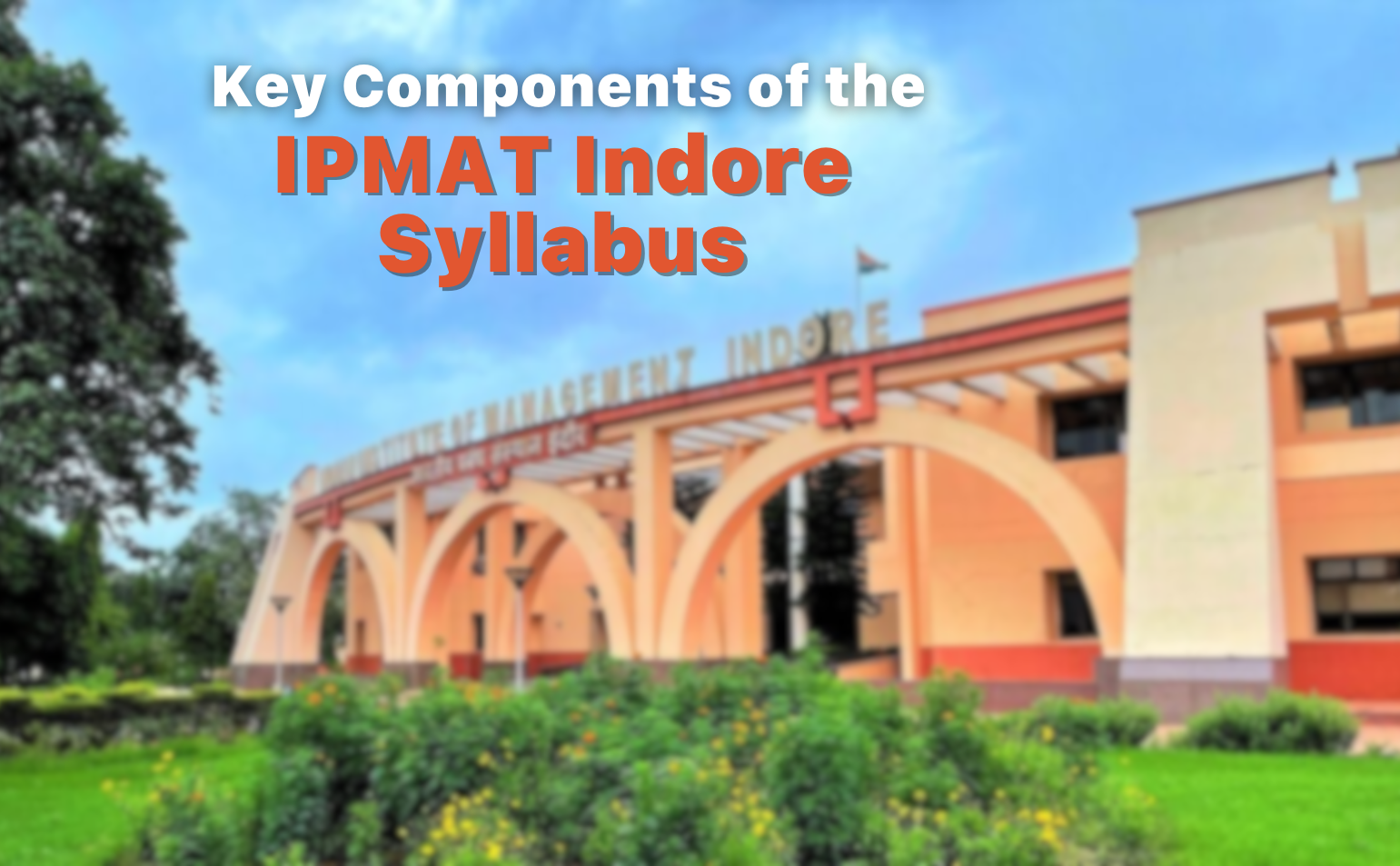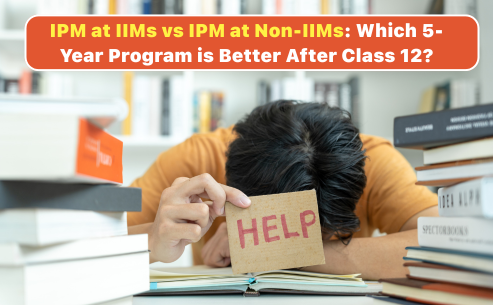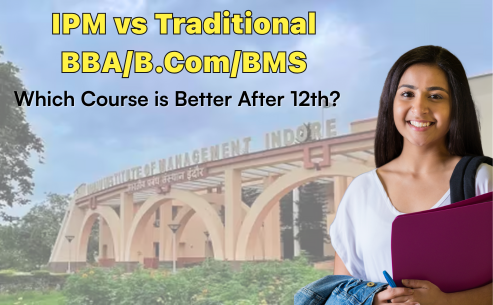The Integrated Programme in Management Aptitude Test (IPMAT) is a crucial examination for students aspiring to enter the prestigious Indian Institute of Management (IIM) Indore. As one of India’s most sought-after management programs, the IPMAT equips students with a robust foundation in management principles. Understanding the IPMAT Indore syllabus is essential for effective preparation. Tarkashastra can help you improve your analytical skills and excel in the exam.
In this blog, we will explore the key components of the IIM Indore IPMAT syllabus and provide strategies for preparing effectively for this rigorous examination.
“Tarkashastra made my MBA CET registration seamless with their guidance and resources at every step.”
Join our classes today.
Add Your Heading Text Here
Overview of IPMAT Indore
The IPMAT is designed for students seeking admission to the five-year Integrated Programme in Management at Indore. This unique program combines undergraduate and postgraduate studies, allowing students who want to enroll in Indore’s five-year integrated management program to pass the IPMAT test. It evaluates the students’ verbal and mathematical proficiency to ensure that only the best applicants are chosen for the program.
What are the Key Components of the IPMAT Indore Syllabus?
The Integrated Programme in Management Aptitude Test (IPMAT) is a key examination for aspirants seeking admission to IIM Indore’s five-year Integrated Programme in Management. Understanding the IPMAT Indore syllabus and exam pattern is crucial for effective preparation. Below is a detailed breakdown of the syllabus for both Quantitative Ability and Verbal Ability, along with the exam pattern for 2025.
What is the IPMAT Quantitative Ability Syllabus 2025?
The Quantitative Ability section assesses candidates’ mathematical skills and ability to analyse and solve problems under time constraints. The syllabus primarily covers topics from Class 10-12 Mathematics and includes essential areas such as:
Topic | Sub-Topics |
Number System | Remainder Theorem, HCF & LCM, Properties of Numbers, Factorial, Finding Unit Digit, Surds & Indices, Simplification, Concept of Factor |
Algebra | Algebraic Formulae, Linear Equations, Inequalities, Quadratic Equations, Logarithms, Functions & Graphs |
Geometry | Basics of Geometry, Angles, Lines, Triangles, Quadrilaterals, Circles, Polygons, Coordinate Geometry, Mensuration, Height & Distance |
Arithmetic Problems | Time & Work, Average, Problems on Age, Percentage, Partnership, Profit, Loss & Discount, Ratio & Proportion, Simple & Compound Interest, Mixture & Allegations, Time, Speed & Distance, Boats & Streams |
Modern Maths | Set Theory, Probability, Permutation & Combination, Sequence & Series, Determinants, Integration & Differentiation, Data Interpretation, Vectors |
Key Points for Preparation:
- Master the Basics: Ensure a strong grasp of fundamental concepts in each topic.
- Regular Practice: Solve various problems to reinforce understanding and improve speed.
- Mock Tests: Incorporate timed mock tests to simulate exam conditions and enhance time management skills.
What is the Syllabus for IPMAT Verbal Ability 2025?
The Verbal Ability section evaluates candidates’ proficiency in English language skills. The syllabus includes:
Topic | Sub-Topics |
Vocabulary | Synonyms, Antonyms, One Word Substitution, Odd One Out |
Reading Comprehension | Inference-Based Passages Critical Reasoning-based passages |
Grammar | Sentence Correction, Sentence Completion, Correct Usage of Words and Phrases, Prepositions, Conjunctions, Tenses, Modifiers & Parallelism, Noun & Pronoun Errors |
Logical Reasoning | Deductive Reasoning, Logical Consistency, Syllogisms |
Other Topics | Sentence Rearrangement, Verbal Analogies, Idioms and Phrases, Foreign Words |
Key Points for Preparation:
- Expand Vocabulary: Regularly learn new words and their meanings to enhance language skills.
- Practice Comprehension: Read various texts to improve comprehension and analytical skills.
- Grammar Exercises: Consistently practice grammar rules and complete exercises for reinforcement.
What are the Books Recommended for IPMAT Preparation?
Book Title | Author | Focus Area |
Quantitative Aptitude | R.S. Aggarwal | Quantitative Ability |
Word Power Made Easy | Norman Lewis | Vocabulary and Verbal Ability |
High School English Grammar and Composition | Wren & Martin | English Grammar and Composition |
What is the Scoring Methodology?
The scoring breakdown for each section is:
Section | Type of Questions | Number of Questions | Marks Awarded |
Quantitative Ability | MCQs | 30 | Each correct answer earns 4 points, while each incorrect answer loses 1 point. |
| Short Answers | 15 | Each correct answer earns 4 points, while no negative marking for an incorrect answer |
Verbal Ability | MCQs | 45 | Each correct answer earns 4 points, while each incorrect answer loses 1 point. |
How to Prepare for the IPMAT Indore Exam?
Understanding the key components of the IPMAT IIM Indore syllabus is just the first step toward effective preparation. Here are some strategies to help you prepare comprehensively:
1. Create a Study Plan
Develop a structured study plan that allocates time for each syllabus section. Ensure that your plan includes:
- Daily Study Goals: Set specific daily targets, covering different topics and questions.
- Revision Time: Allocate time for regular revision to reinforce what you have learned.
2. Use Quality Study Materials
Utilising the right resources is crucial for effective preparation. Consider the following:
- Books: Invest in books that comprehensively cover the IPMAT Indore syllabus. Look for authors and publishers known for their quality content.
- Online Resources: Explore online courses, video lectures, and practice tests specifically designed for IPMAT preparation.
3. Practice with Mock Tests
Mock tests are invaluable for preparing for the IPMAT. They help you:
- Familiarise Yourself with the Exam Format: Understand the structure and types of questions you will encounter.
- Improve Time Management: Practice completing the paper within the allocated time to enhance speed.
- Identify Weak Areas: Analyze your performance in mock tests to identify strengths and weaknesses, allowing you to focus your studies accordingly.
4. Join a Coaching Institute
Consider enrolling in a coaching institute that specialises in IPMAT preparation. Benefits of joining a coaching centre include:
- Expert Guidance: Access to experienced faculty who can provide insights and tips.
- Structured Courses: Well-designed courses that cover the entire syllabus and offer practice sessions.
Peer Learning: Interaction with fellow aspirants can motivate you and provide additional learning opportunities.
5. Focus on Mental and Physical Well-being
Preparing for a competitive exam can be stressful. Prioritise your mental and physical well-being by:
- Taking Regular Breaks: Ensure you take breaks to avoid burnout and maintain focus.
- Engaging in Physical Activity: Regular exercise can help improve concentration and reduce stress.
- Practising Mindfulness: Meditation and yoga can enhance mental clarity and focus.
6. Stay Updated on Exam Notifications
Keep updated with the latest information regarding the IPMAT Indore syllabus and exam patterns. Regularly check the official IIM Indore website for announcements related to:
- Exam Dates: Be aware of the schedule and important deadlines.
- Changes in Syllabus: Stay informed about any syllabus or exam format modifications.
Conclusion
In summary, understanding the key components of the IPMAT Indore syllabus is essential for candidates aspiring to enter IIM Indore’s prestigious Integrated Programme in Management. By focusing on the three primary sections—Quantitative Ability, Verbal Ability, and Reading Comprehension—and employing effective preparation strategies, candidates can enhance their chances of success in this competitive examination. With consistent effort, targeted practice, and a strategic approach, achieving a high score in the IPMAT is well within reach. Embrace the challenge and embark on your journey towards a rewarding career in management!
Succeeding in the IPMAT requires sharp analytical skills. Tarkashastra can be a great asset. It helps you dissect complex problems, uncover hidden insights, and build strong arguments. These abilities are crucial for tackling the challenging questions in the IPMAT. Studying and applying Tarkashastra can enhance your reasoning skills and significantly improve your IPMAT score. Embrace this traditional wisdom to strengthen your thinking and excel in your preparation!
FAQs
-
1. How can students effectively study for the quantitative ability section of the IPMAT Indore exam?
Students can effectively study for the Quantitative Ability section by focusing on understanding fundamental mathematical concepts and practising regularly. Consistent problem-solving, using various resources, and taking mock tests can help reinforce learning and improve speed and accuracy. Additionally, reviewing mistakes and understanding the underlying concepts can enhance performance.
-
2. What are the major topics included in the verbal ability section of the IPMAT Indore syllabus?
The major topics in the Verbal Ability section of the IPMAT Indore syllabus include grammar, vocabulary, sentence completion, and critical reasoning. Candidates should also focus on reading comprehension, which involves understanding and interpreting passages from various subjects. A strong grasp of these areas is essential for success in this section.
-
3. How important is general awareness for the IPMAT Indore, and how can students prepare for it?
General awareness is moderately important for the IPMAT Indore, as it helps develop a well-rounded perspective, especially for personal interviews later in the admission process. Students can prepare by reading newspapers, following current affairs, and using general knowledge books or online quizzes to stay updated on important events and topics.
-
4. Are any specific books or resources recommended for preparing the IPMAT Indore?
Yes, several books are recommended for IPMAT Indore preparation, including Quantitative Aptitude by R.S. Aggarwal, Word Power Made Easy by Norman Lewis, and High School English Grammar and Composition by Wren & Martin. Additionally, resources like Arun Sharma’s books on quantitative aptitude and various online platforms offering mock tests can be beneficial.
-
5. How can students create a study plan to cover all key components of the IPMAT Indore syllabus?
Students can create a study plan by breaking down the syllabus into manageable sections and allocating specific time slots for each topic. Setting weekly and monthly goals can help track progress. Incorporating regular revisions and practice tests into the schedule ensures comprehensive coverage of all key components while allowing time for adjustments based on performance.
-
6. What are some effective strategies for managing time during the IPMAT Indore exam preparation?
Effective time management strategies include setting a daily study schedule, prioritising difficult topics, and using timers during practice sessions to simulate exam conditions. Students should also allocate time for breaks to avoid burnout and maintain focus. Regularly assessing progress and adjusting the study plan as needed can help ensure that all topics are covered efficiently.







